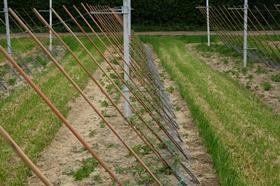
A new ‘light interception’ system is being trialled at apple orchards in Kent and Herefordshire in an attempt to capture more sunlight and boost yields.
The Hutchinsons Enhanced Light Interception Orchard System (Helios) sets out to explore the question of how plantings and orchard design can be improved to achieve this.
Hutchinsons, the agricultural and horticultural input advice company behind the trial, said it was mindful of establishment costs and likely future developments in mechanisation such as robotic picking and mechanical pruning.
The project leads on from work done in New Zealand by Stuart Tustin, who is based at Plant and Food Research in Hawkes Bay.
According to Trustin, yield potential is ultimately a function of light utilisation, and current orchard systems will always fall short of their theoretical maximum yields becasue they fail to intercept a proportion of the available sunlight.
Helios seeks to put these theories into practice under UK conditions andultimately find ways for apple trees to capture more sunlight.
“Cordon and espalier tree types have been understood and grown in gardens for vary many years, and perhaps provide a clue of the way forward,” Hutchinsons said. “A simple planar canopy with little depth can be manipulated to intercept more light and promises to be amenable to increased mechanisation.”
The trial orchards in East Kent and Herefordshire also incorporate evaluation of novel tree configurations on M116 rootstock from tree nursery Frank P. Matthews.
M116 is of particular interest because of its resistance to drought, phytophthora and woolly aphid resistance. Hutchinsons said the rootstock should also have a positive influence on reducing canker, due to improved root health, and fruit quality and size for all Gala and Braeburn clones.
“M116 is more vigorous than M9, so is being evaluated planted as both ‘laydown’ trees resembling a single guyot grapevine, as well as intensively planted spindle trees but without the support or expense of a wirework trellis,” Hutchinsons said.
The sites also host the first UK plantings of a number of varieties from the Netherlands nursery company Carolus.



